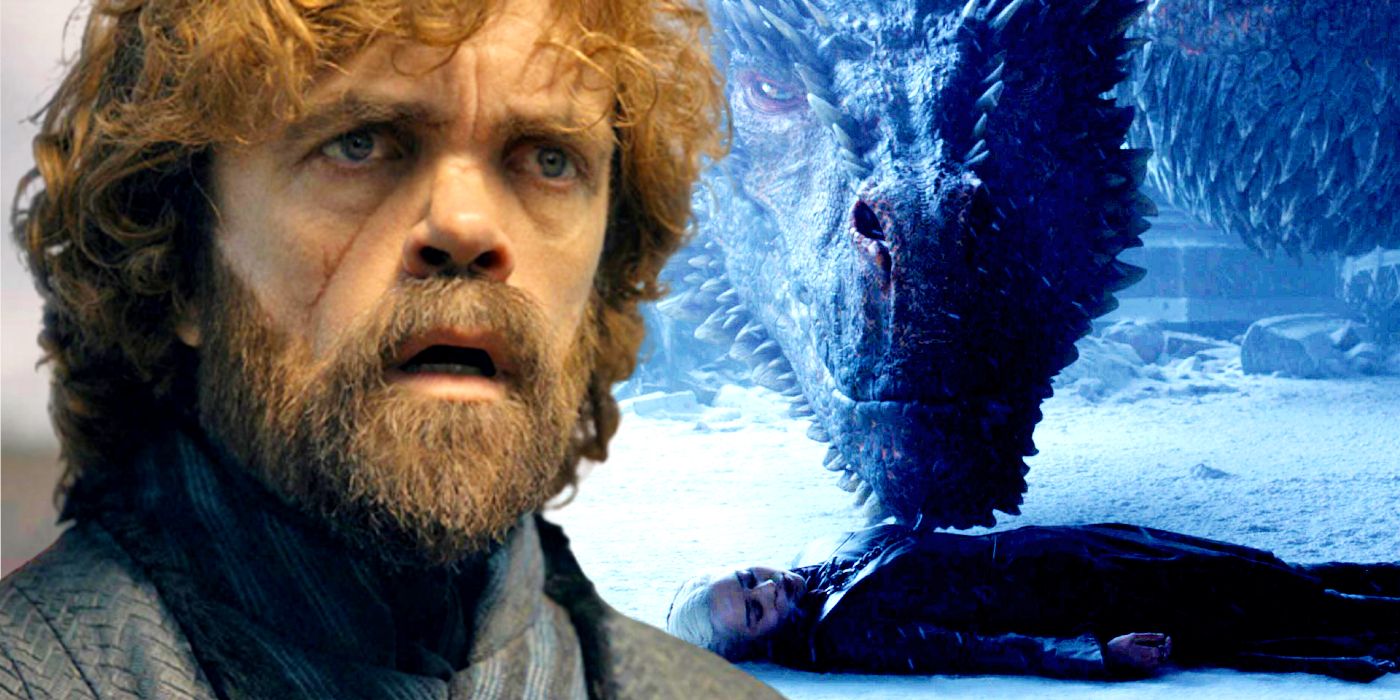Although widely criticised upon release and still a point of division (at best) among viewers, it’s also apparent Game of Thrones season 8 never killed the show. Game of Thrones dominated the TV landscape in the 2010s, conquering audiences and critics alike on its way to an unprecedented level of success. The last of television’s monoliths in a changing landscape that was already shifting towards streaming releases and binge-watching well before its end, Game of Thrones season 8 should’ve been a fond final farewell to one of the greats, but instead of one last crowning achievement it seemingly massacred its own reputation in a manner that made the Red Wedding look tame.
The backlash to Game of Thrones season 8 massively snowballed across the final three episodes of the truncated run. Following on from the Night King being dispatched, the issues started to come thick and fast as the show itself sped towards the ultimate endgame. Game of Thrones season 8’s coffee cup came in for a roasting, but it was character arcs like those of Daenerys Targaryen and Jaime Lannister that left a bitter taste in some fans’ mouths. Thus it was largely proclaimed that Game of Thrones’ ending was a disaster, a TV finale nightmare down there with the worst of them. With that came the idea that the show as a whole had been killed, suddenly vanishing into the air like it’d been stabbed by Arya Stark; Game of Thrones season 8, and in particular the finale, had killed the show, its rewatch value, its popularity, and its legacy. No one talks about Game of Thrones anymore, apparently.
But is that really the case? It’s true that Game of Thrones season 8 caused huge damage to the show, and that, even if you were among those who enjoyed said ending, the backlash came to define season 8 and, in part, the show itself as a whole. Still, for all the talk of Game of Thrones being dead (and ironically, the talk of people not talking about it), it does seem as though the series is alive and well after all. What does Game of Thrones say to the God of Death? You know the rest.
Game Of Thrones Is Still Popular After Season 8
While Game of Thrones season 8 may have severely hurt the show’s critical reputation and seemingly killed audience interest, the latter, at least, has remained strong in the years since the show ended. That’s perhaps not too surprising given it was one of the biggest shows of all time when on the air, but that it’s maintained a level of popularity despite such an overwhelming backlash is notable. Game of Thrones was one of 2021’s most-pirated TV shows; indeed, season 8 was the sixth most pirated show, and all of those above it were seasons of shows that releases new episodes in 2021, whether brand new series like WandaVision or ongoing hits such as The Walking Dead. Game of Thrones held a similar position the year prior: as of August 2020, well over a year out from season 8, it was still the most pirated show in the world, although The Mandalorian ultimately took the crown that year.
It isn’t just among those looking for illegal means to watch TV that Game of Thrones has remained popular. Hard streaming data remains somewhat elusive, but Game of Thrones was among HBO Max’s biggest movies and shows in the first year of its launch, and remains a flagship property for both the streaming service and HBO in general (with multiple spinoffs in the works). Search traffic for Game of Thrones remains reasonably high - in the past year in the US, it steadily beat out all of Marvel’s Disney+ shows, for example, across the 12 month period (via Google Trends), although they did have much larger spikes when on the air. On IMDb, Game of Thrones remains among the most popular shows (the highest placing show that isn’t ongoing or hasn’t released new episodes in the past few months). None of this on its own is particularly hard evidence, of course, but altogether it shows a clear interest in (and discussion of) Game of Thrones remains even after season 8.
Why Game Of Thrones Is Still So Popular
If Game of Thrones season 8 was so bad, then why didn’t it kill the show? In part it may simply be that Game of Thrones is too big a property to ever have truly failed, no matter the response to its episodes. It’s a TV show that not only regularly pulled in 10s of millions viewers worldwide, but dominated the pop-culture conversation as well. There are plenty of TV shows - especially the long-running network favourites - that receive strong ratings even if, anecdotally, they don’t receive much chatter, but Thrones was the water-cooler show that blew said water-cooler apart. That itself establishes a lasting legacy and, perhaps, a curiosity: much like, say, a Friends or The Sopranos, it’s the kind of show to inspire a shocked “you’ve never seen it?!” response when someone says they haven’t watched it, and that generally means it’s the kind of show that will always retain interest.
Aside from helping to shape the TV landscape of the 2010s, there’s a simpler reason for Game of Thrones’ enduring popularity: it’s great TV. Whether it’s the first watch or a rewatch, there remains a lot of value in the show that season 8 can’t (or at least shouldn’t) detract from. There is Game of Thrones as a series of moments: Ned Stark’s death, the Red Wedding, incidents that have become shorthand not only among discussions of the show, but for shocking moments on other series. And so with that, then seeing those for the first time, or seeing them again, helps to further ensure Game of Thrones endures. But beyond that, Game of Thrones remains, at its best, incredibly compelling and compulsive viewing. Beyond the epic battles and shocking deaths, it excels in the details and the dialogue, which allow for a rich experience every time you watch it.
Finally, of course, it’s worth considering that a lot of people simply…enjoyed Game of Thrones season 8 and ending. The backlash to the show dominated the conversation, but the tweets, think pieces, and petitions represented a small fraction of the show’s audience. For many, it’s at least theoretically possible that Game of Thrones season 8 represented a solid ending to a TV show they liked; for people who loved the show but disliked the ending, there may also be a temptation to rewatch, after some time, to see if it gets better, much the same as there’ll be plenty who never want to see it again. With the whole series available, then it makes sense audiences who’d never watched before would binge it, whether that’s streaming the show on HBO Max or via more illicit means, and whether they’re even aware of the backlash or not: it could be to see what the fuss is about, but again, a lot of TV viewers may not have followed such conversations, and instead simply know of Game of Thrones as a big TV show that, eventually, is worth watching.
Will Game Of Thrones Season 8 Get Better With Time?
The notion that time heals all wounds isn’t necessarily one else true in Game of Thrones - just ask Robert Baratheon or Khal Drogo - and yet, in pop culture terms, it can often hold true. Art is often re-evaluated and re-appraised across the years, which applies to mediums such as film and television: 2001: A Space Odyssey was divisive upon release, and is now a classic considered among the greatest sci-if movies ever made. Game of Thrones isn’t 2001, of course, but it’s an (extreme) example of how opinion can shift. Perhaps a better case is with the Star Wars prequels: disliked at the time, their reputation got worse (thanks to burgeoning internet reviews and fan-led discussions, such as Red Letter Media’s takedowns), but have eventually got better. That’s because of rewatching, but also as the audience has shifted: those who grew up watching (and loving) the prequels coming to define conversations in the present. And it can work the other way too, for instance the amount of people who have discovered and found major problems with older shows like Friends in recent years.
Since Game of Thrones is such a big part of TV history, remains popular, and had such a divisive finale, then it isn’t unreasonable to assume that it’s one that will come to be re-appraised in time: perhaps after House of the Dragon, which should further restore interest in the show and remind people of why they loved Game of Thrones to begin with. Perhaps it’ll be if/when George R.R. Martin finishes his books, and there’ll be a true comparison. Perhaps it’ll be after HBO is five spinoffs deep into exploring Westeros and beyond and people are so sick of it that things come full circle and there’s a longing for what it used to be. But with time, and reviewing with the knowledge of what’s going to happen rather than the expectation of what might, Game of Thrones season 8 should only prove to be more rewarding as the finale becomes more distant. What is dead may never die; Game of Thrones may not exactly rise harder and stronger than before, but its ultimate legacy as all time great TV should increasingly be secured.




